Green Spaces, Growing Communities
In this blog, Kassy Price explores three standout green spaces—Princes Park, La Salle Hotel School, and Vauxhall Health Centre Garden—and speaks to the volunteers, asylum seekers, healthcare workers, and families who bring them to life.
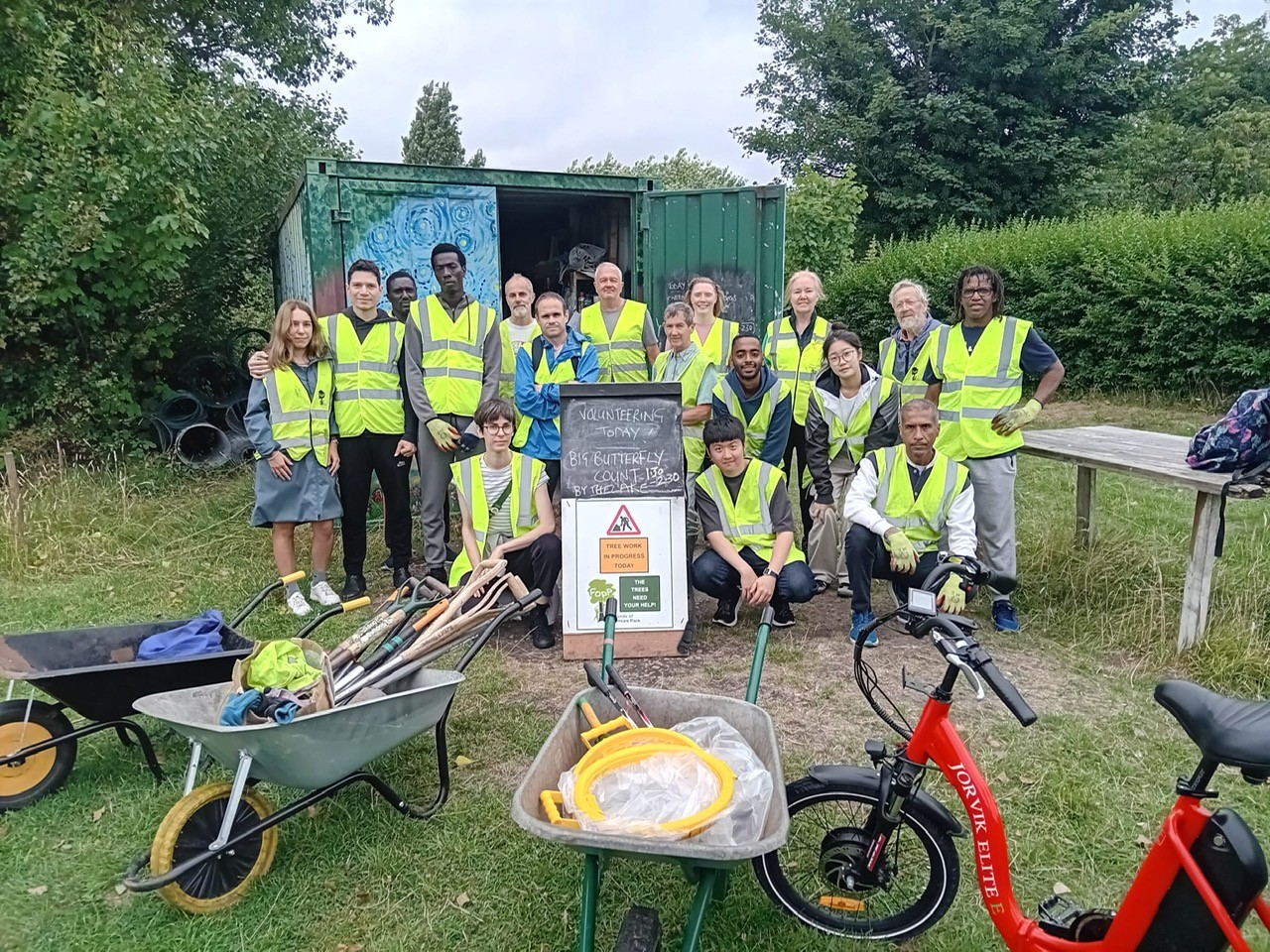
What Makes Parks and Green Spaces ‘Work’ For A Community?
There’s no doubt that green spaces in urban areas have benefits, but what do the people who use them think, and have they experienced these benefits themselves? I visited three green spaces in Liverpool to find out what they offer to each community, and what impact they have had on the individuals who use them.
Princes Park
Princes Park in Toxteth is the quirky next-door neighbour to Sefton Park. Being smaller, it is often overlooked but it is no less beautiful and holds a special place in the hearts of residents. There is a lake, tennis courts, a ping-pong table and a play area, and it’s great for foraging blackberries, apples and wild garlic if you know where to look. This Victorian park boasts hidey-holes and winding paths, an island with a Nelson Mandela memorial on it, and the grave of a beloved donkey called Judy. Princes Park is also the host of Liverpool’s Park Run which is held there every Saturday. Many of the surrounding properties are flats or terraces with yards, so lots of people use the park to have barbecues and picnics.
It is extremely well-kept, with a dedicated group of volunteers, Friends of Princes Park meeting every fortnight to maintain it. The group was started by locals in 2004. Since then they have planted 4000 trees, created wildflower meadows and built a wooden version of Stone Henge. They also arrange events such as wildlife walks and butterfly counts where they speak to other locals about ways the park could be improved.
I spoke to Laura, the new chair of the group, to capture her thoughts on what she loves the most about Princes Park and whether spending time there impacts her wellbeing.
“My favourite thing about Princes Park is that it's a little bit quieter and less-known than Sefton. Princes is like a hidden gem. It makes me feel relaxed. It’s so nice to get a little bit of nature, to hear the birds and the rustling of the trees.” Laura pointed out all the different ways that people use the park and how she loves to see people enjoying it. That particular day there were majorettes practising, people playing cricket and football, and the tennis courts were in use, as they usually are.
But has the park improved Laura’s wellbeing? “Definitely. Coming for a walk is good for your mental health but volunteering and doing physical work is like an outdoor gym. Lifting things and using your physical strength, even litter-picking. It’s good for both mental and physical health.”
Another one of the volunteers is Sean from Taiwan, who loves the beautiful scenery that the park offers and the friendly people who come and speak to him while he is working. “Everyone is peaceful and very lovely. On weekdays, I’m a student studying English. I’m quite busy with work…so on a weekend I can come here to help others and help to organise the park. The atmosphere helps me relax, it’s very beneficial to my health.”
Groups like this are also a perfect way for those seeking asylum to make new friends and to integrate into a society that must feel strange to them. Mohamed is an asylum seeker from Sudan and was keen to tell me how the volunteering work and the park make him feel and how it helps him. "Princes park is a very nice park, I really like the environment here. I feel happy when I volunteer. I feel healthy and I feel good because I get good exercise and fresh air.”
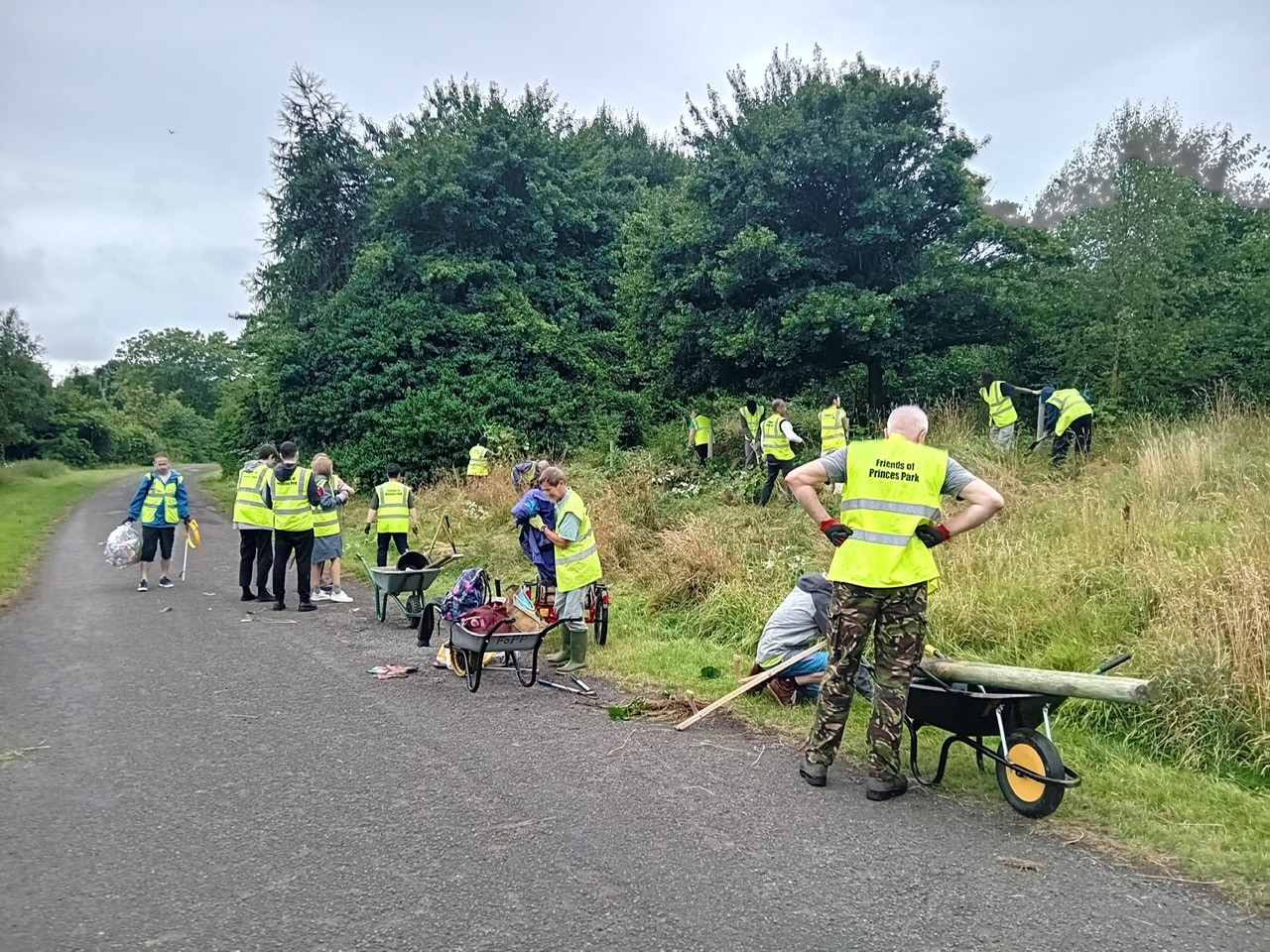
Some of the volunteers keeping Princes Park tidy
Friends of Princes Park is one of the main reasons the park is so welcoming, pretty and successful as a community led green space. Some of them have been volunteering for years, and even do litter-picks of their own accord, whenever they feel the need. It’s easy for parks to become neglected and strewn with litter, so volunteers are crucial and there are many people willing to do it.
La Salle Hotel School
While inside La Salle’s polytunnels, it’s easy to forget you’re in Croxteth in Liverpool. Bunches of grapes dangle from the ceiling and melons and tomatoes grow all around. Outside the polytunnels there are fruit trees, raised beds and a beehive, but Gerry Proctor, the chair of La Salle, wants people to know that La Salle isn’t just a small space that grows food. It’s part of a bigger project; to give young people a career pathway for the rest of their lives, into the hospitality sector.
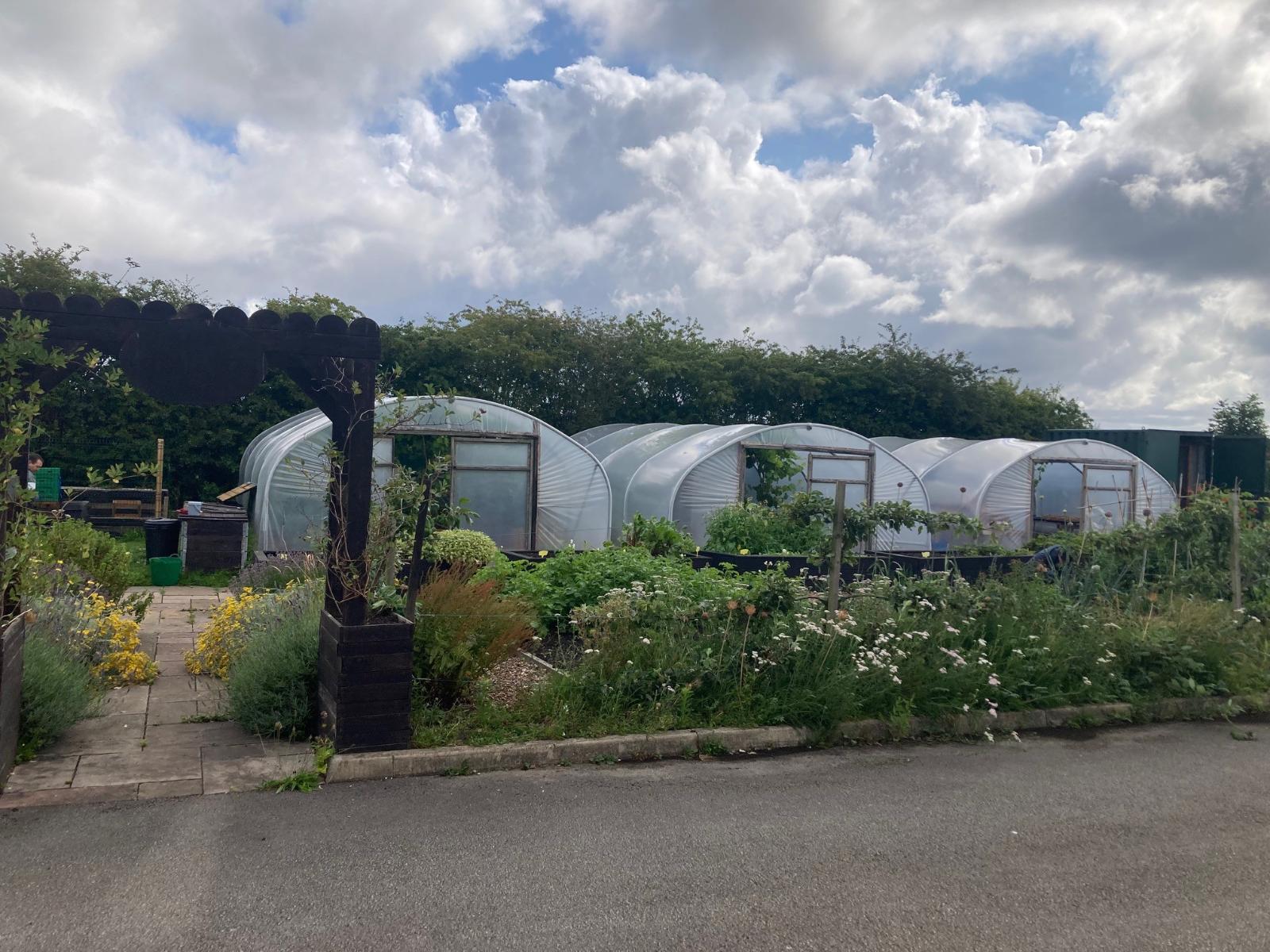
The polytunnels at La Salle
The aim is to turn their building into a state of the art, fully functioning hotel where they will train young people in catering, hospitality and horticulture. There will also be a restaurant on site, serving food they’ve grown themselves. The idea is that anyone who comes to the hotel or restaurant will be invited to walk through the gardens to see what’s growing.
La Salle also has a project called Growing Families which enables families to grow their own produce. It grew from Gerry’s desire to help people who live in the area but don’t have any history of gardening. The families came to the centre, learned about food growing, and were then given their own raised bed at home, for free.
“In our Growing Families project, families told us that the children had never eaten vegetables until they grew them themselves. Now they’re eating vegetables and the family's health is changing and they’re beginning to find out about the food system and what it’s like to grow your own food.”
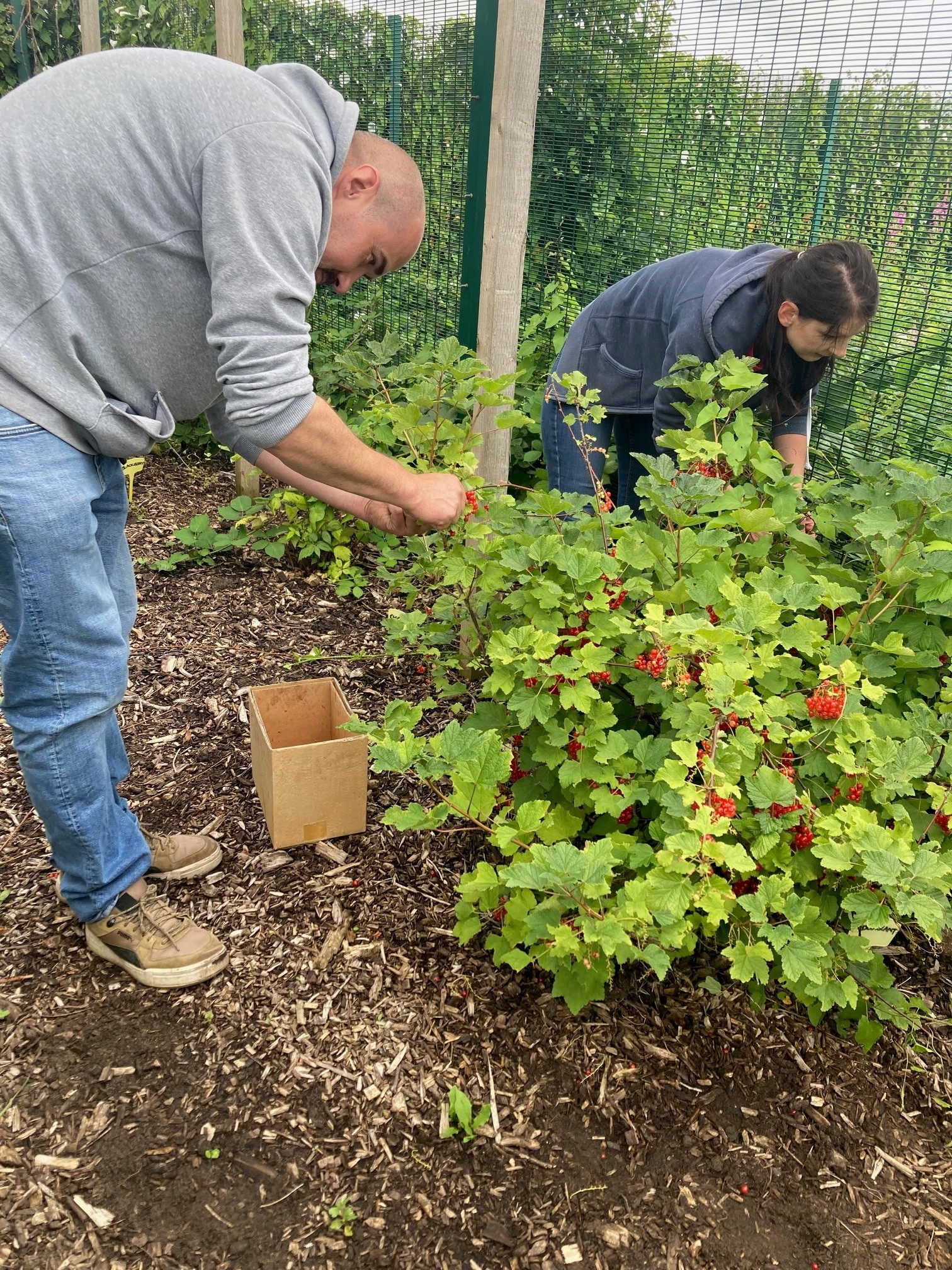
Some fruit being grown at La Salle
La Salle offers City and Guilds Horticulture courses run by Myerscough College. In the last four years, thirty-eight residents have completed levels 1 and 2.
One of these participants is Kerry, a volunteer who spoke with infectious enthusiasm and passion about the project. “Having places like this is immeasurable when it comes to communities. I think it is something that should be afforded to all people. There should be more of them. We haven’t got much green space left anymore have we? And what we have got is being taken when it shouldn’t be.”
Kerry suffers from fibromyalgia but when she is having a bad day, she can do tasks like collecting seeds and picking currants while sitting down. She reports that when she gets home after working in the garden, she does feel tired but it’s a good tired, and her sleep has vastly improved, as well as her mental health.
“Even though the physical aspects might be harder for me, it’s a great thing for my mindset and my mental wellbeing. This lifts me. I just can’t put into words what it does for me mentally. It makes me feel emotional.” Kerry gets a buzz from putting something in the soil, watching it grow and eating it. The fact it is free from chemicals appeals to her too. Before volunteering, Kerry suffered from OCD and was very strict about household chores. Now she says the obsessive thoughts have disappeared and she is more at peace with leaving tasks until the next day.
“I have my blips but when I’m here, I don’t care whether the dishes have been done. I’m focusing. It’s a good thing, not just for me but for everyone around me because I’m in a good headspace. Now I’m a much better Kerry to be around and everyone has noticed!”
Jakub is part of a family who volunteer at La Salle. Jakub’s wife did a course to get into gardening and improve her English and now they attend La Salle’s family day with their children, and volunteer throughout the week too.
As well as feeling reconnected with nature, the big draw for Jakub is beekeeping and he is now doing a class in it.
“I feel good, it’s made me happy. Working with animals, living creatures. The way they live, the queen, the drones, the workers, it’s something fantastic. It’s interesting.”
His children are nine and twelve and they enjoy family day and spending time with the other children. When they see what their parents are growing, it piques their interest. They ask a lot of questions and are keen to join in and grow their own things.
“They love the taste of the fruit. Have you ever tried anything grown from a garden? It tastes totally different from what you get in the shops. I love the salad and tomatoes. When you go to the supermarket, they have a different taste.”
The children also see the process of planting, watering, feeding and the effort that goes into growing. “They don’t waste food because they know someone spent a lot of time and energy on it.” Jakub says that working on the garden has also taught the children how to properly manage their time, because you have to plan life around the plants.
When asked how he feels when he spends time with his family at La Salle, Jakub said, “We feel happy. Now we do things together. We plant something and we talk about what we did during the day. Spending time here together makes the relationship much closer. It’s a good way to spend time together as husband and wife.”
Vauxhall Health Centre
A visit to the doctor is often something we dread, but some patients from Vauxhall Health Centre go there for fun. That’s because down the side of the building is a garden full of fruit, vegetables and vibrant flowers. It’s unique because it is run by the GPs and tended to by the practice manager, the patients and volunteers. The garden was mostly Dr Barry Green’s idea, but teamed with the strategic mind of his colleague, Dr Nadja van Ginneken they made it come alive together. The idea came about when Barry began gardening at home, and saw the benefits to his own health. So Barry and Nadja approached the partners of the practice and asked to start a garden.
It was small at first, with just two or three planters, and Barry managed a group of volunteers on a Tuesday. With funding from Groundswell, they were able to go a bit bigger and with the help of the company Kindred, they started their own winter workshops, which included making wreaths and jam. When asked about what she thinks about green spaces, Nadja said, “There’s a huge benefit. If we go by the benefits here, we see the volunteers taking products home. We got a photo of a salad the other day with three of our ingredients. People are really proud of what they’re doing. They see things grow, so it’s really good for them and their connection to food and nature.”
Nadja pointed out the lack of gardens in the area and how the surgery’s garden enables the volunteers to have contact with real food and the earth. It’s also great for the staff, as it used to be just a strip of grass. Now it’s much nicer to sit in and they come out whenever they’re able to.
“I love it. When I’m on call and I get a small break I can come out, and we’ve got a list that says what needs doing. So I’ll do some weeding and go back after five or ten minutes and feel refreshed.”
Marie Wheldon, the practice manager explained that the staff work long hours, sometimes thirteen hours a day and previously, the only time they’d go outside was a quick trip to the shop. So a place which is aesthetically pleasing, where they can get fresh air, is a real benefit for them.
“This is an oasis in the middle of a built up area. Green spaces remind me of why I’m here and where I’ve come from. This space is really helpful for me to have a break from screens and technology. There’s nothing better than taking your shoes off and putting your feet on the grass and really rooting yourself back into nature. It’s such a valuable resource for people to connect with nature. It’s fantastic for mental health and relaxation.”
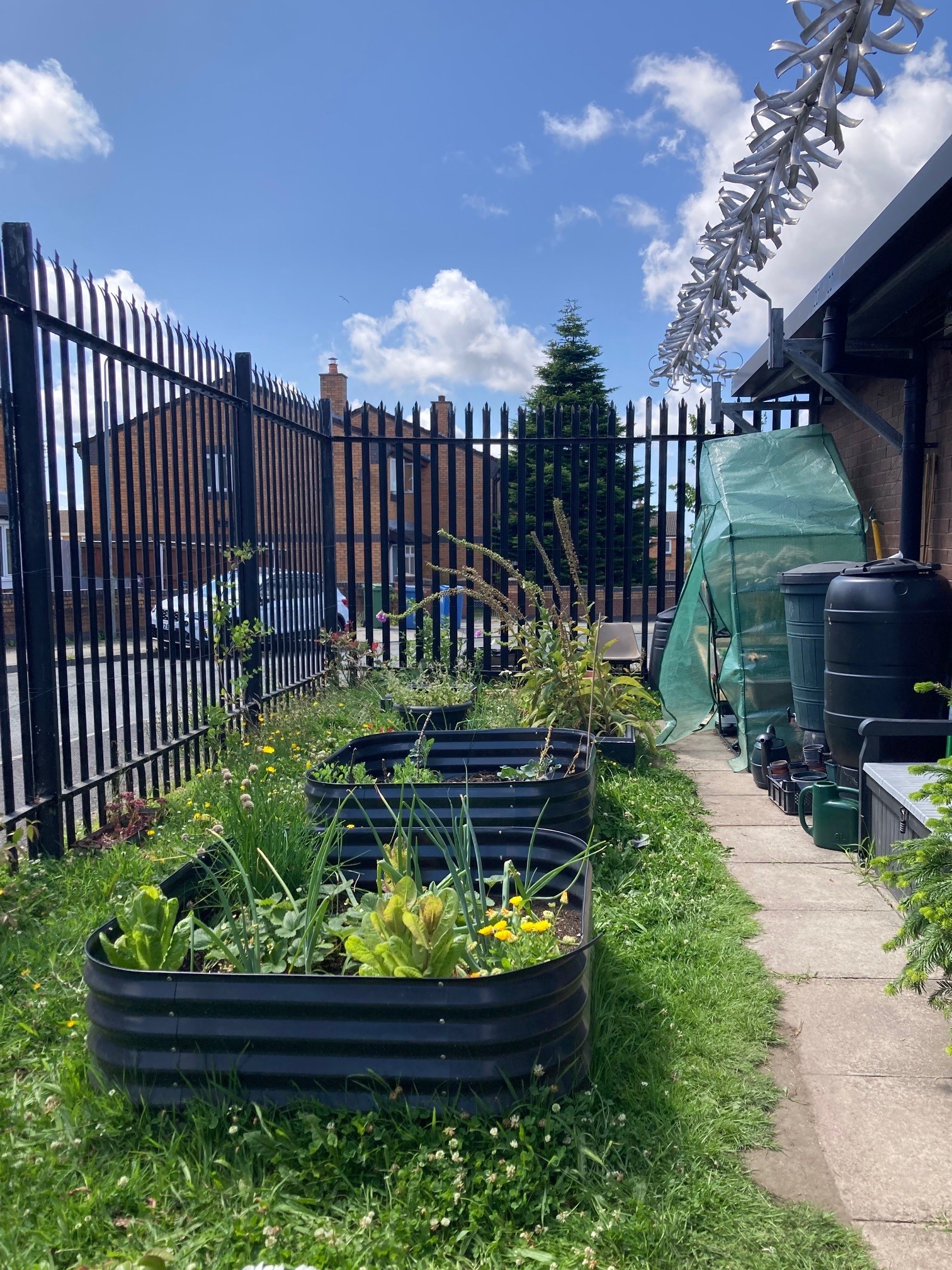
The garden plot at Vauxhall.
What Barry likes best is the little impacts it has on others. How people walk past and see the flowers, and are inspired to have a chat through the fence about what’s growing. Patients who never had any previous experience with gardening have learned how to grow food, and the space has allowed social contact for people who are lonely or widowed.
They’re watching little things like ladybirds or caterpillars or spiders and seeing how nature works and things grow. And they’re doing it, they’re achieving it, they’re growing food and making meals. That for me is one of the big values.” Barry gave his thoughts on Liverpool’s parks and green spaces and how there is a north/south divide. The tree equity score in north Liverpool is very low compared to the south, which translates into the health outcomes.
“Where you’ve got less green space, you’ve got worse health outcomes. You’ve got worse diets because people don’t know how to grow food. Some people don’t know what a healthy diet is and they don’t have access to green spaces. We know that there’s loads of evidence that getting out in green spaces - not just walking but doing something, being involved in it, can contribute to health and wellbeing. All across the city we need to use our space effectively whether that’s wasteland, roofs, school fields, council owned land. All of this space can be healthy, biodiverse and productive land and we need to enable that and enable the people who live there to do it.”
The benefits of green spaces for communities are endless. They give opportunities to learn, to integrate into communities, to play sports, run and get involved in fun activities. They are places to grow food, to make friends, to help us relax and unwind.
What makes our green spaces and parks work for a community, is the community itself. It’s people with good ideas and good hearts, and other people who are willing to give their time to breathe life into those ideas. And as these parks and gardens grow into something bigger, they inspire others, which leads to more ideas, more volunteers, more aesthetically pleasing green spaces and a happier, healthier community with more knowledge and more things to do right on their doorstep.
Kassy Price, Community Blogger
Media
groundswell@qub.ac.uk




